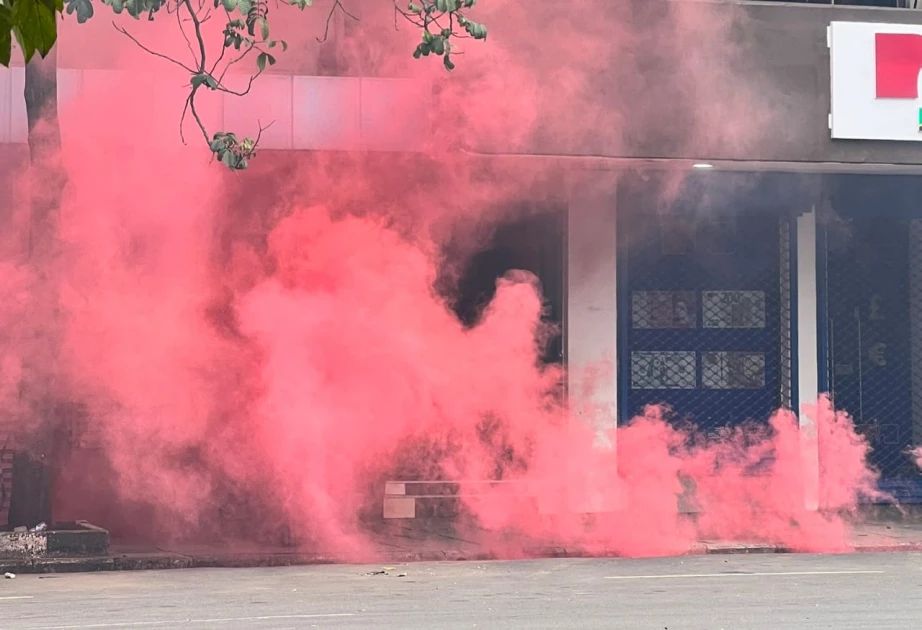It’s like living inside a teargas canister: Nairobi street families share their story

It takes quite some effort to breath and keep your eyes open while in Nairobi CBD. Photo/Citizen Digital
It takes quite some effort to breath and keep your eyes open. It’s like trying to open your eyes in the salty waters of the Indian Ocean.
The smell of teargas fills the air in Nairobi. People sneeze here and there; others cough as their bodies react to the fumes that still permeate the air.
It’s like a mini competition of coughing and sneezing, but one with no winner.
The fumes do not discriminate; expectant mothers, street children, pedestrians, the sick who are trying to get to hospitals, motorists, hawkers and little children, all share in this 'little punishment'.
Steven Orieto, who is asthmatic, says Wednesdays through to Fridays are not often his best days.
“I have to wear a mask most of the time, but even this does not help much. It’s like walking inside a cloud of smoke with pilipili,” says Orieto, a resident of Nairobi.
“Wednesdays and Fridays are our days of shedding tears, especially those of us who come to town daily,” he adds.
The smell of teargas that linger in the air only tell half the story of what transpired on these city grounds on Tuesday.
The streets look beaten, and withered, an aftermath of the running battles between the police and the rioters.
Some sections of the Central Business District (CBD) resemble a riot kitchen, where riots are cooked, and teargas added as an ingredient.
On the streets, a street family can be seen seated on a pavement, somewhere along Tom Mboya street. The children are running up and down, their mother is deep in thought. They are here to replenish their begging bowls having not made it to the streets on Tuesday.
Not far away, another woman is deep asleep, probably in an attempt to compensate for hours of missed sleep.
Then there is this mother, with a child straddled on her back, and another one walking by her side, begging from passersby.
Most people are not in the mood of giving -- they are busy sneezing and coughing.
“Sisi uhama tao kukiharibika on Tuesdays na Thursdays,” says one of the street mothers who only identifies herself as Mama Njeri.
Others, she says, often remain behind and try to wither the storm – because CBD is the only home they know.
But now, living in it is like existing inside a teargas canister.
According to Mama Njeri, most of the teenagers and even older street children, sometime join the riots just for the fun of it.
Others, she says, especially the truant and unscrupulous ones, often use the moment to fend for food, clothing, and other needs.
One thing is certain – their lives have taken a turn these past few weeks.
“We get food by begging. Sometime we get food from hotels, the remains of food left by customers, but now, with hotels closed due to the riots, it means we go hungry,” shares Mama Njeri.
Vin, a street boy, says him and his ‘clan of boys’ hardly sleep these days.
“I lost my blanket, and cartons which served as my bedding to rioters. Somebody used them to light fire,” he says.
Vin says he often relocates to the outskirts of the town until things cool down, but says it’s dangerous out there given street families can be very territorial.
Nairobi streets, he says, often becomes more dangerous to street families, especially those with young children, young girls, and pregnant mothers.
Meanwhile, it is important to note that the State Department for Social Protection has shifted the focus of rehabilitation of street families from the children’s homes to family and community care.
The first national census of street families in the country was held in 2018 by the State Department for Social Protection in partnership with Kenya National Bureau of Statistics (KNBS) and United Nations International Children’s Fund (UNICEF).
According to the census, counties with the highest concentrations of street persons are Nairobi with 15, 337, Mombasa 7, 529, Kisumu 2,746, Uasin Gishu 2,147 and Nakuru 2,005.
Most of the 46,639 street persons were males at 72.4 percent and females at 27.6 percent, the majority being the youth at 45.3 percent followed by children at 33.8 percent and the older persons at 2.4 per cent.
Want to send us a story? SMS to 25170 or WhatsApp 0743570000 or Submit on Citizen Digital or email wananchi@royalmedia.co.ke
Comments
No comments yet.


Leave a Comment